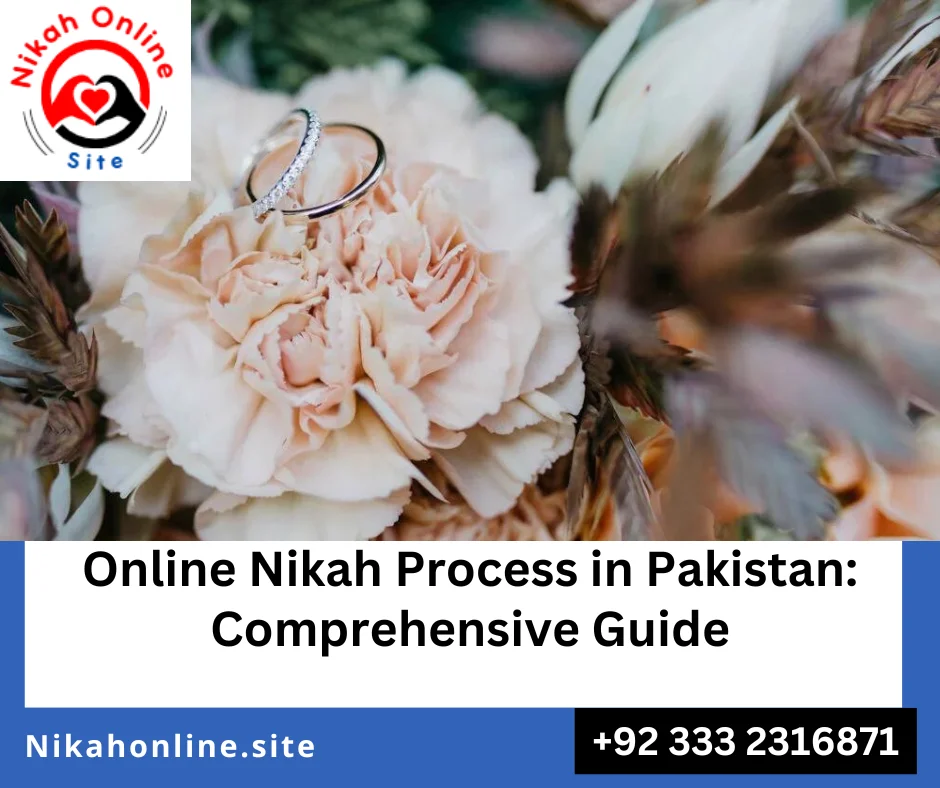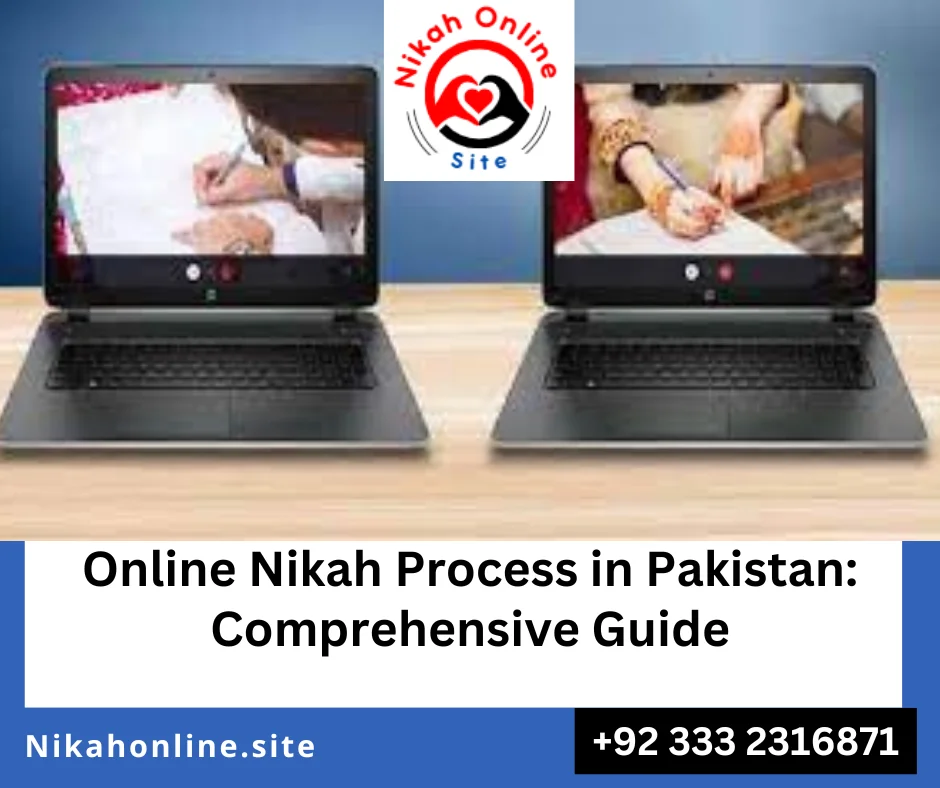Online Nikah Process in Pakistan: Comprehensive Guide
What is Nikah?
Nikah is the Islamic marriage contract, integral to Muslim culture and religious practices. It serves as a formal agreement between two parties, often referred to as the bride and groom, to enter into a lifelong partnership. The Nikah contract is not merely a ceremonial formality; it embodies significant religious, social, and legal implications within Islamic traditions. By entering into this contract, the couple commits to fulfilling their respective rights and responsibilities towards each other as mandated by Islamic law.
The essence of Nikah lies in the mutual consent of both parties. This is a fundamental aspect that distinguishes Nikah from secular marriage; it ensures that both the bride and groom willingly enter this lifelong bond. Without sincere and clear consent, the Nikah lacks validity. Another critical component of this procedure is the Mahr, or dowry, which the groom must provide to the bride. This gift symbolizes respect and financial security, reaffirming the groom’s commitment to the partnership. The amount and form of the Mahr can vary widely and are often agreed upon before the Nikah ceremony.
Additionally, the role of witnesses in a Nikah is paramount. Islamic teachings stipulate that at least two male witnesses or one male and two female witnesses must be present for the contract to be legally recognized. This requirement not only ensures transparency but also provides a communal testimony to the establishment of the marriage. In countries like Pakistan, including major cities such as Karachi, Islamabad, Rawalpindi, and Lahore, the Nikah process has evolved to incorporate modern conveniences, such as the option for an online nikah. This allows couples to fulfill their religious obligations in a manner that suits contemporary lifestyles and schedules.
The Evolution of Nikah: Traditional to Online
The practice of Nikah, a fundamental element of Islamic marriage, has undergone a significant transformation from traditional rituals to the contemporary online nikah process. Traditionally, Nikah involved in-person meetings, detailed religious ceremonies, and physical documentation processes, which necessitated the presence of both families and witnesses. These gatherings fostered communication and relationship building within communities, often leading to a strong emphasis on familial approval and social customs. However, the advent of technology has brought forth a new era in the institution of marriage in Pakistan, particularly in urban centers such as Karachi, Islamabad, Lahore, and Rawalpindi.
As society has evolved, so too have the methods by which individuals meet and marry. The rise of online platforms has revolutionized communication, allowing individuals to connect beyond geographical confines and cultural barriers. The transformation to online nikah has streamlined this process, providing a more efficient means of navigating potential compatibility issues, exchanging information, and conducting discussions about marriage without the immediate pressures of face-to-face interaction.

However, this shift towards an online nikah procedure is not without its challenges. The authenticity of online platforms can vary, leading to concerns regarding the verification of identities and the legitimacy of the nikah process. Additionally, cultural perceptions around online marriages may still present hurdles for some families who cling to traditional values. On the other hand, the benefits of convenience, accessibility, and reduced logistical complexities regarding travel and preparation for the ceremony can make online nikah more appealing. Moreover, financial considerations, including online nikah fees and other charges, can be substantially lower compared to traditional arrangements.
Overall, the evolution of Nikah from traditional to online methods illustrates the profound impact of technology on cultural practices, enabling a more inclusive and flexible approach for couples navigating their marital journey in contemporary Pakistan.
The Legal Framework for Online Nikah
The concept of online nikah has emerged as a modern approach to marriage in Pakistan, gaining significance in cities like Karachi, Islamabad, Rawalpindi, and Lahore. However, several legal requirements and regulations govern the online nikah process. Understanding these legal frameworks is essential for prospective couples wishing to ensure that their marriage is recognized by law.
Firstly, the validity of online contracts is a key aspect in the legal framework of online nikah. In Pakistan, marriages must comply with Islamic law and the Marriage Act of 1974. The legal recognition of a nikah conducted online hinges on the fulfillment of these requirements. Both parties must consent voluntarily, and the presence of witnesses is crucial. Many authorized institutions have adapted their procedures to accommodate the online nikah format, ensuring that all parties can participate from different locations.
Moreover, the online nikah procedure involves specific steps that must be adhered to for a marriage to be legally binding. Couples must register their intention and provide necessary documentation to a registered nikah registrar. It is also essential that these registrars are authorized by law and are equipped to handle online procedures effectively. This ensures that the marriage complies with both religious and legal norms.
Different countries exhibit varying approaches to the legality of online marriages. In Pakistan, despite the advancement of technology, traditional methods still play a significant role. Legal recognition of online nikah is gaining traction, but the process still requires meticulous adherence to the established legal framework, minimizing ambiguities. Essential to this framework are the online nikah fee and other charges that may arise, which should be transparent to the couples involved.
Understanding the legal intricacies involved in online nikah ensures that couples can navigate the process smoothly, securing their marital status within the established laws of Pakistan.


Preparing for Online Nikah: Steps to Take
Preparing for an online Nikah involves several essential steps that ensure the ceremony is conducted smoothly. First and foremost, gather the necessary documents required for the online Nikah procedure. This typically includes identification documents such as valid CNICs or birth certificates, along with any other legal documentation requested by the officiant or the platform you choose. It’s crucial to have these documents ready, as they facilitate a seamless registration and validation process.
Next, you need to select an appropriate online platform where the Nikah will take place. Several applications and websites offer virtual ceremony capabilities, allowing couples to choose an option that best fits their comfort and technical requirements. It is advisable to ensure that the platform you select is user-friendly and supports the necessary video and audio features for a successful ceremony.
Choosing the right officiant is another significant aspect of preparing for your online Nikah. Make sure to select an experienced officiant who is familiar with conducting ceremonies online and can provide you with guidance on the required Islamic traditions. It’s prudent to check the officiant’s credentials and read reviews from other couples who have previously utilized their services to ensure quality and reliability.
After confirming these details, scheduling your online Nikah ceremony is the next step. Coordinate with your officiant and chosen platform to find a suitable date and time that works for both parties, keeping in mind time zone differences if applicable. Ensure that you also inform family and friends about the event, as their presence, even virtually, can enhance the significance of this important milestone.
By following these steps, you can effectively prepare for your online Nikah in major cities of Pakistan such as Karachi, Islamabad, Rawalpindi, and Lahore, ensuring that the process is efficient and meaningful.
Conducting the Online Nikah Ceremony
The online nikah ceremony represents a modern adaptation of traditional Islamic marriage practices, ensuring legal and religious acknowledgment while accommodating the needs of contemporary couples. To begin, both the bride and groom must be present during the ceremony, either physically in the same location or through a reliable online platform. This virtual setting not only facilitates participation from various geographical locations, including major cities like Karachi, Islamabad, Rawalpindi, and Lahore, but also allows families and friends to witness the event remotely.
The officiant holds a central role in the online nikah procedure. Typically a qualified Imam or religious scholar, the officiant is responsible for reciting the necessary Islamic prayers (duas) and leading the ceremony according to the prescribed rituals. This includes the proposal (Ijab) from the groom and acceptance (Qabul) from the bride, both of which should be clearly communicated in the online setting. An audio-visual connection aids in making the proposal and acceptance articulate, ensuring every participant feels involved and engaged despite the remote nature of the ceremony.
Furthermore, proper planning is vital to avoid any technical difficulties. Test runs can be beneficial, ensuring that both the audio and video functions are operational on the chosen platform. Additionally, it is essential to provide all participants with the link for the virtual meeting well in advance. During the ceremony, the officiant must remind participants to switch on their cameras to foster a sense of connection and community.
The online nikah fee and any additional charges involved in organizing such a ceremony can vary by location and specific requirements, so it is advisable for couples to confirm these details beforehand. By maintaining clear communication and focusing on adherence to Islamic customs, the online nikah ceremony can be conducted smoothly, providing a meaningful experience for all involved.


Post-Nikah Steps: Legalizing the Marriage
Once the online nikah has been completed, the next crucial step for couples is to legalize their marriage. This process involves several significant actions that ensure the union is recognized both legally and religiously. It is imperative to follow the correct online nikah procedure to avoid complications in the future.
First and foremost, couples need to obtain an official marriage certificate. This document serves as proof of the marriage and is required for legal recognition. Couples must apply for the certificate through the relevant local authority in their respective cities, such as Karachi, Islamabad, Rawalpindi, or Lahore. The necessary documentation may include a copy of the online nikah contract, identification cards, and witness information. It is vital to check with local regulations to ensure all requirements are met when submitting the application.
Following the acquisition of the marriage certificate, registering the marriage is essential. It is advisable for couples to visit the local marriage registration office in their area to finalize this process. Failing to register the marriage can lead to issues with inheritance, custody, and other legal matters in the future. Additionally, couples should pay attention to the online nikah fee and any other charges associated with registration. These costs can vary depending on the locality, hence planning and budgeting for these expenses is necessary.
Moreover, compliance with both Islamic and civil laws is a fundamental aspect of the post-nikah procedure. Couples are encouraged to familiarize themselves with their rights and responsibilities under both legal frameworks. This knowledge not only promotes harmony in the marriage but also aids in navigating any potential challenges that may arise.
In conclusion, legalizing the marriage after the completion of an online nikah is a vital step that should not be overlooked. By following the proper procedures and ensuring compliance with local laws, couples can secure their marital status and foster a strong foundation for their future together.
Common Challenges Faced in Online Nikah
The introduction of online nikah processes has transformed the way couples in Pakistan, including major cities like Karachi, Islamabad, Rawalpindi, and Lahore, embark on their marital journey. However, this transition does not come without its challenges. One of the most significant issues is technical difficulties, which can arise during the online nikah procedure. Many couples may face internet connectivity problems or software glitches that can disrupt the flow of the ceremony. Having reliable technology and backup options is crucial to alleviate these concerns.
Another challenge is the emotional and psychological anxiety stemming from the remote nature of the online nikah. Couples may feel a sense of detachment or lack the personal touch that in-person ceremonies provide. This distance can lead to feelings of isolation or uncertainty. To mitigate these feelings, couples could consider engaging a trusted officiant who can help make the online presence feel more personal and intimate. Ensuring that both families are involved, even through video calls, can also strengthen bonds during this significant event.
Cultural resistance can pose yet another hurdle in the online nikah process. Traditional views on marriage may lead some individuals and families to question the authenticity and legitimacy of an online ceremony. This skepticism is not uncommon in societies that place a high value on traditional rituals. Educating loved ones on the legal standing and benefits of online nikah can be beneficial. Couples may also seek endorsements or guidance from community leaders who can amplify the acceptance of online nikah as a legitimate alternative.
In conclusion, while the online nikah procedure offers conveniences and efficiency, navigating the associated challenges requires preparation and communication. By understanding these hurdles and proactively addressing them, couples can successfully engage in this modern approach to marriage while respecting cherished traditions.


Benefits of Choosing Online Nikah
The evolution of technology has transformed various aspects of life, including the process of marriage in Pakistan. One of the most significant advancements in this arena is the option to undergo an online nikah. The benefits of choosing an online nikah can be substantial, particularly for couples who may face geographical barriers or other constraints.
For long-distance couples, the online nikah procedure offers unprecedented accessibility. Traditionally, couples separated by distance would need to coordinate travel arrangements to meet for the nikah ceremony, often leading to inconvenience and additional expenses. However, online nikah allows couples in cities like Karachi, Islamabad, Rawalpindi, and Lahore to complete their marriage requirements from the comfort of their homes. This ease of access can facilitate a quicker arrangement, ensuring that couples can engage in their marital commitments without unnecessary delays.
Another key advantage of the online nikah procedure is the flexibility it affords. In contrast to traditional ceremonies, which can be restricted by venue availability and social obligations, online nikah allows couples to choose a timing that works best for them. This flexibility can significantly reduce the stress associated with planning a wedding, easing the transition into married life.
In addition, the online nikah process simplifies formalities. With a reduction in paperwork and in-person requirements, couples can navigate the obligations associated with marriage more smoothly. While there may be some charges involved, such as the online nikah fee and other charges that might be incurred, the overall convenience often outweighs these costs.
Moreover, online nikah can promote inclusivity by allowing individuals with mobility issues or those in different geographical locations to participate fully in their marriage process. Thus, choosing online nikah not only addresses logistical concerns but also fosters a more egalitarian approach to matrimony in Pakistan.
Future of Nikah: Trends in Online Marriage
The concept of Nikah has evolved significantly, particularly with the advent of technology, leading to the rise of the online nikah process. As society becomes more digitized, the acceptance of online marriages across various cultural and religious frameworks is also increasing. In many major cities across Pakistan, including Karachi, Islamabad, Rawalpindi, and Lahore, online nikah services are gaining traction, reflecting the changing dynamics of marriage in a modern context.
One of the primary factors influencing this trend is the convenience offered by online nikah procedures. Couples today, often facing busy schedules and geographical barriers, appreciate the ability to complete their marriage registration online. This technological shift enables them to manage the online nikah fee and other charges easily, streamlining the process without the need for extensive in-person visits. Such developments are particularly appealing to younger generations who are increasingly relying on digital platforms for their daily transactions.
Moreover, as more individuals embrace online platforms for essential life events, the services that cater to these needs are expected to evolve. Marriage registrars are likely to enhance the user experience by integrating advanced communication tools, such as video conferencing, which would allow for virtual ceremonies to take place in a legally recognized manner. This would facilitate the online nikah and help address the need for inclusivity where family members or friends can participate from different locations.
Future developments may also include applying blockchain technology for greater transparency and security in documenting marriages. As online marriage services expand, addressing legal and procedural aspects will become crucial to maintaining the integrity of the online nikah process. Overall, the future of nikah seems promising, integrating tradition with innovation to accommodate a diverse demographic seeking meaningful connections in an increasingly modern world.
